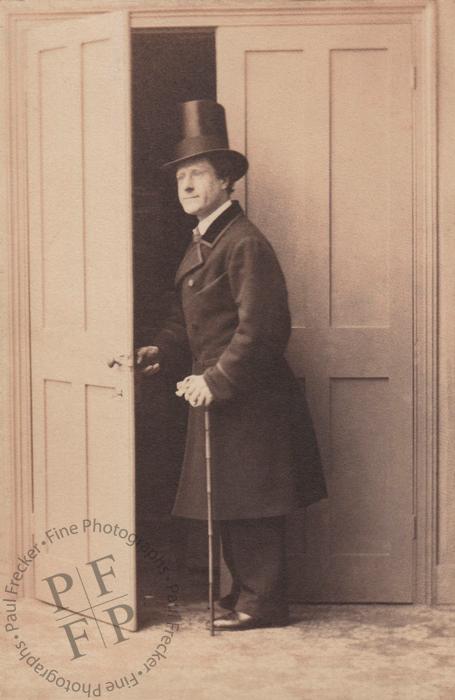Johnny Clarke
(1829-1879)
‘Both the playgoing public, who have lost the services of an admiral comedian, and the Theatrical Profession, who will miss the companionship of a widely esteemed friend, must receive with the deepest regret the intelligence that this deservedly popular actor is no longer among us. Since the death of his wife Mr John Clarke had greatly suffered in health, and during the last two months his illness, arising from a deeply-seated affection of the lungs, increased to such an extent that but small hope could be entertained of his ultimate recovery. For some days past those who had called to see him brought back reports of increasing fits of coughing and of rapidly diminishing strength; and on Thursday morning, at half-past eight, he expired at his residence, 15, Torriano-avenue, Camden-road. His age was about fifty. In early life Mr John Clarke showed a strong predilection for the stage, and eventually he gave up a photographic establishment in Farringdon-street, which he had opened with some prospect of success, and went as “general utility” to several country Theatres in succession. His first appearance before a London audience was in January, 1852, at the Strand Theatre, then under the management of Mr Allcroft. The part he played was Master Toby, in Wilkins’ play of Civilisation. During a speculative management at Drury-lane he made a further trial of his abilities, appearing, October 7th, 1852, as Fathom, in The Hunchback, but, the season only lasting a few nights, he returned to the Provinces, and reappeared in September, 1855, at the Strand, taking the position of principal comedian, and making a notable hit, as Ikey, the Jew, in Mr Leicester Buckingham’s burlesque of Belphegor, produced in September 1856. At Christmas, 1857, he was engaged by Mr E.T. Smith, for Drury-lane, and appeared as Old Proverb, in the Pantomime of Little Jack Horner. Returning to the Strand in 1858, when Miss Swanborough had raised the Theatre to more importance than it had previously acquired, Mr John Clarke established himself as a prominent member of a really excellent company., and at this establishment he remained several years, identifying himself with a memorable series of characters in the extravaganzas written by Francis Talfourd and H.J. Byron […], his memory will long be preserved by all who were frequenters of the Theatre during the brightest period of its prosperity. As a grotesque singer and dancer he had rare advantages […]. Subsequently he accepted an engagement with Mr Benjamin Webster at the Adelphi, joined the Olympic company, and made a marked impression as Quilp, acted for some time at the Globe Theatre, played at Covent-garden during the Christmas season, when The Babes in the Wood was produced, for two years he was prominently associated with the Prince of Wales’s Theatre, and finally appeared at the Criterion, where he performed with great success in several new pieces, and the revival of The Porter’s Knot. In 1873 Mr John Clarke married the clever actress Miss Teresa Furtado, who expired at the early age of thirty-two, August 9th, 1877’ (‘Death of Mr John Clarke,’ The Era, 23 February 1879).

